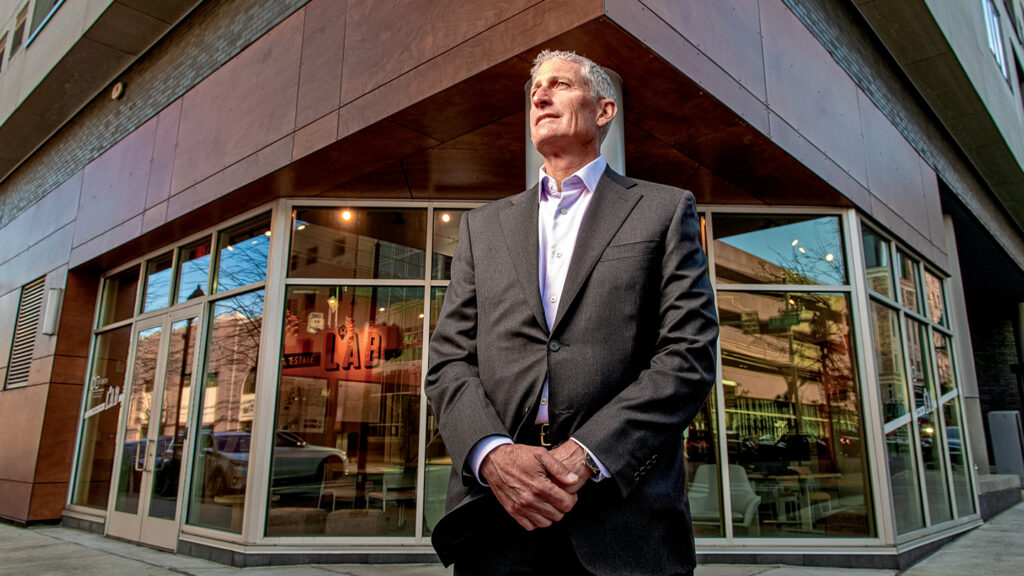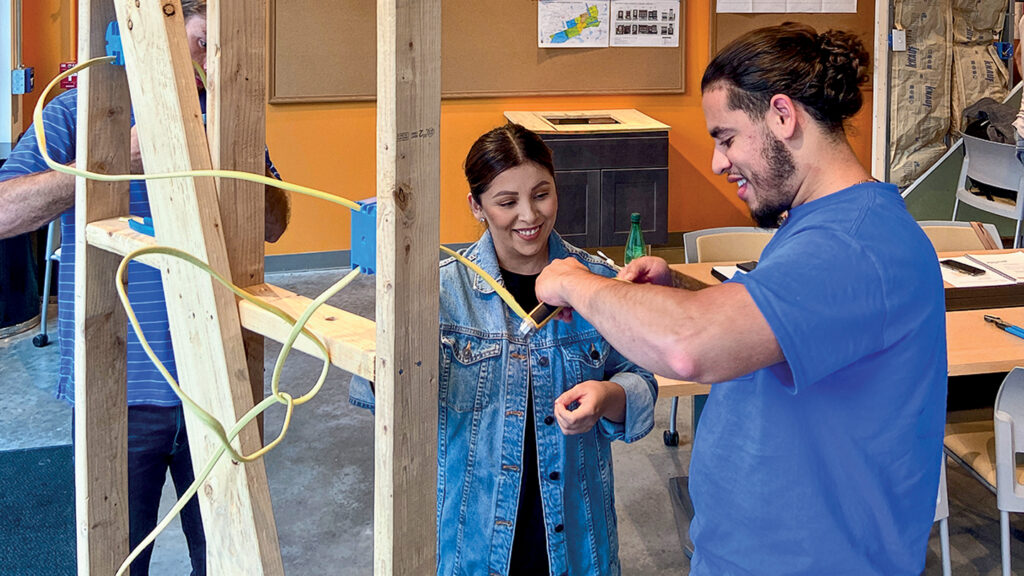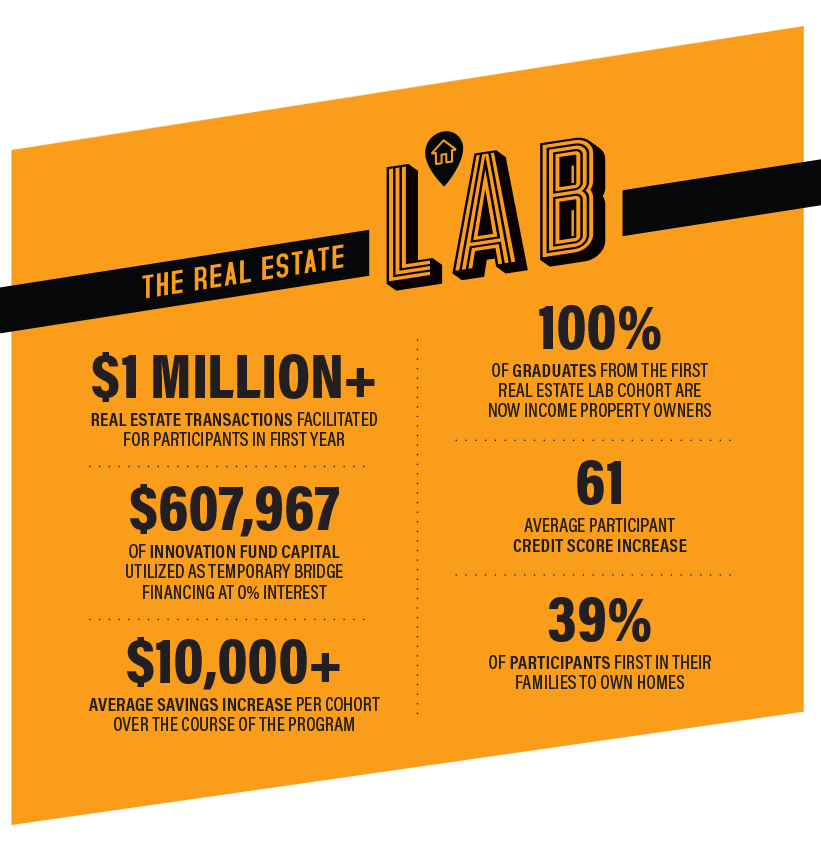Building Dreams
After a flurry of gang-related activity seized Allentown, Pa., in 2019, J.B. Reilly ’83—co-founder and president of City Center Investment Corp., an award-winning real estate development company committed to the revitalization of the city’s downtown area—hosted an unusual meeting. That summer, he helped bring together several community leaders and invited local gang members to engage in thoughtful dialogue about what could be done to improve the city.

J.B. Reilly ’83, co-founder and president of City Center Investment Corp., stands in front of the Real Estate Lab’s downtown Allentown classroom space, which he donated to the program.
“As we walked with these young people through their neighborhoods to build a relationship with them, we stumbled upon one of the first properties I bought in 1985,” Reilly says. “When I told them about how I renovated the property, and how real estate investment is something anyone can do as long as they have what they need to get started, I saw their eyes light up. It clicked that there was an opportunity to connect at-risk youth with something constructive.”
While attending a networking event in the Lehigh Valley that fall, Reilly bumped into Yusuf Dahl, director of the Dyer Center for Innovation and Entrepreneurship at Lafayette College, who over the course of his life has found himself on both sides of the struggle to strengthen America’s most vulnerable neighborhoods. After Dahl was imprisoned at age 18 for operating a network of drug houses in Milwaukee, a chance meeting with a real estate investor changed the course of his life.
“I was out of prison all but eight months, and I was looking for an apartment to rent,” Dahl says. “This guy who owned apartments in the city was showing me different places, and one day he told me I should get into real estate. At the time, I didn’t know anything about real estate. No one in my family owned a property. But he told me I could work with him on the weekends, and he would teach me about it.
“Every weekend, I worked for free, tearing off roofs, sanding floors—anything that helped me understand how to renovate a property. He also taught me about the business side—how to think like an investor, differentiate between an asset and a liability, and how to leverage debt as a tool. It was all luck; there was nothing about the system or my community that supported it. This man provided a pathway for me to invest in my community, and I was able to build a successful career.”
Dahl eventually built a portfolio of more than 200 residential and commercial units and founded an award-winning property management company. He holds an MPA from Princeton University and an MBA from University of Wisconsin–Milwaukee.
As Reilly and Dahl chatted on that equally serendipitous evening in 2019, Reilly laid out his vision for getting underrepresented youth involved in real estate. “I thought he was pulling my leg,” says Dahl, who—unbeknownst to Reilly—gave a TEDx talk in 2017 about how the marginalized have the potential to activate opportunities in blighted communities with underutilized properties, if only given the support to do so.
Realizing their minds and ambitions were on the same wavelength, Reilly and Dahl decided to join the forces of Lafayette’s Dyer Center and City Center Investment Corp. to create a program that would provide underrepresented groups with access to not only the education, training, and mentorship to break into the real estate investment business, but also the financial backing they need to launch their careers—which, in turn, would help give Allentown the breath of fresh air it so desperately needed.
Thus, the Real Estate Lab was born.
THE CONCEPT
Launched in January 2020, the Real Estate Lab is a free 10-week program that is intricately designed to provide its students with what Reilly and Dahl identified as the three key tools to becoming an investor: knowledge, networks, and capital.
The lab begins with a comprehensive curriculum that introduces participants to entrepreneurship through the lens of real estate investing and teaches them the A-to-Z of the industry. In a classroom space in downtown Allentown that was donated by Reilly, participants are mentored on topics like budgeting, banking, accounting, financial analysis, legal concepts, property acquisition and management, risk assessment and mitigation, market research, and more.
I’ve always been interested in real estate, but because I wasn’t born in this country, I never thought I could dream that big … The Real Estate Lab opened doors I was not expecting it to open … It was life-changing for me.
Carmen Bilecki, member of first cohort
to graduate from the Real Estate Lab
“The curriculum starts with how the students think,” says Mathew Pezon ’10, who teaches Real Estate Lab classes and helped build the program’s curriculum. “Because our participants’ demographic has historically been excluded from real estate ownership, we want to bridge that gap and help them walk away with a mindset of a successful investor that they might not have been exposed to otherwise.”
Another key component of the in-class experience is helping students evaluate their relationship with money and learn how to take control of their personal finances. Pezon works closely with lab participants to educate them on not only spending and saving, but also improving their credit scores.

The Real Estate Lab classroom experience is complemented with hands-on fieldwork, during which participants learn how to increase property value—and thus create income generation potential—by making repairs and renovations. Here, graduates Andrew Santiago and Carmen Bilecki learn the basics of electrical wiring.
“We help participants pay off their credit cards and anything they owe, and we help them understand the importance of credit—because they can’t buy property if they have unpaid debts and can’t get a loan,” Pezon says.
Along the way, the Real Estate Lab also invites successful entrepreneurs and business professionals from across industries to share their stories and expertise. This is a chance, Dahl explains, for participants to expand their professional networks and see themselves in the success of others.
“It gives the students the opportunity to interact, ask questions, and begin to build relationships with these industry professionals,” Dahl says. “For example, if the participants are learning about finance, we invite a banker. For a lot of these students, it can be intimidating to meet with a banker. But we take away that intimidation by helping them interact with these folks in a professional way. We encourage our lab participants to follow up with the speakers on LinkedIn and make the connection with these key players in the space.”
Carmen Bilecki, a first-generation immigrant from Mexico and a member of the first cohort to graduate from the Real Estate Lab, explains that, for her, the speakers were one of the most memorable aspects of the entire experience.
“Hearing from someone like Borko Milosev [investor and founder of investment firm Post Road Management, LLC]—who is also an immigrant, and who started washing dishes and is now a millionaire—and seeing him not stopping at anything just showcases that through hard work and the right network, you can accomplish anything. It was extremely touching,” Bilecki says.
The participants’ classroom learning is also complemented with two to three weeks of hands-on fieldwork, during which students visit properties in person and learn how to increase their value—and thus create income generation potential—by making repairs and renovations.
“We had the opportunity to try things out ourselves, and now I’m able to do things that seem simple but aren’t, like changing a toilet or doing the electrical for a light switch,” Bilecki says. “Those are things I didn’t think I was capable of doing.”
The final element of the Real Estate Lab’s three-pronged approach is to provide capital to assist participants in taking their investment goals from concept to reality. Once they complete the program, graduates interested in investing in the city of Allentown have access to the Allentown Neighborhood Innovation Fund—$1 million of which was seeded by Reilly—to help them get started.
“We provide what is essentially bridge financing that allows students to acquire their first Allentown-area properties, make improvements to those properties so that they can be positioned for refinance, and use the equity in those properties to start building their portfolios,” Reilly says.
It’s a comprehensive strategy that works, Dahl adds, and the proof is in the numbers.
THE IMPACT
Despite launching at the outset of the pandemic two years ago, the Real Estate Lab has thrived in the face of the looming threat of COVID-19. With the third cohort now underway, the lab has already hit several impressive milestones.
In its first year, the program facilitated over $1 million worth of real estate transactions for lab participants. To date, nearly $1.1 million worth of real estate has been purchased by the students, and nearly $700,000 of the Innovation Fund has been utilized by the graduates as temporary bridge financing at 0% interest. On average, participants have seen a 61-point increase in their credit scores, as well as a $10,000 savings increase per cohort over the course of the program. Thirty-nine percent of the participants were the first in their families to own homes.

“All the students from the first group are proud income property owners now, and they’re now starting to look at their second and third properties,” Reilly says.
But participants’ firsthand accounts of their experiences in the lab are what speak—louder than any statistic—to the program’s success and overall impact.
“It’s quite remarkable when you see what it means to these young people to be able to gain this knowledge and start building a future,” Reilly says. “Every student has a story. These are young people who have a lot of challenges and not a lot of opportunities, and we are transforming their lives.”
Bilecki, who stumbled across the Real Estate Lab while reading an article about it on LinkedIn, says the opportunity presented itself at just the right moment.
“It came at the hardest time of my life, a time when I felt like giving up, and it gave me a purpose,” she says. “I was going through a divorce, and I was extremely vulnerable—not really feeling capable of myself. I’ve always been interested in real estate, but because I wasn’t born in this country, I never thought I could dream that big. In our community, we’re taught that we’re not a part of the winning groups. I never thought it would be possible for someone like me to become an investor—especially because it’s such a male-dominated industry.”
The only woman in her cohort, Bilecki says she is grateful for the skills, knowledge, and experience she gained as a result of her participation in the program. She used what she learned in the lab to not only save several thousand dollars and increase her credit score by more than 20 points, but also start her search for her first investment property and secure a full-time marketing job at a construction company.
“The Real Estate Lab has opened doors that I was not expecting it to open,” Bilecki says, “and it feels really good knowing I’m able to share the space with so many males and accomplish as much as they are able to. It was life-changing for me.”
Each cohort comprises approximately 13 students, and participants hail from a vast range of backgrounds and walks of life. Past graduates have included immigrants, a social-service professional, a sales representative, and a former gang member—all of whom share an innovative spirit and the desire to help their community. The program has particularly focused on recruiting and supporting entrepreneurs of color, with 89% of participants identifying as non-white.
Lab participants, however, aren’t the only ones who reap the benefits of the lab. Lafayette students also have a unique opportunity to get involved in the program in several different capacities, allowing them to put their own education into practice—no matter their field of study. Undergraduates have been tapped for special projects like designing the Real Estate Lab website, managing the program’s digital marketing communications, and more.
While working for the Real Estate Lab, I’ve grown immensely as a specialist and team member … I’m grateful for all the skills I’ve acquired and connections I’ve made along the way.
Maksym Turkot ’24, Lafayette student
and Real Estate Lab software developer
Savvy computer science major Maksym Turkot ’24, for instance, harnessed skills he’s acquired in his Lafayette courses to build the lab’s customer relationship management (CRM) system, the web application lab instructors use to track participant performance and attendance, give students feedback on their assignments, and store and share course-related documents.
“While working for the Real Estate Lab, I’ve grown immensely as a specialist and team member,” says Turkot, who is considering a career in software engineering. “I learned data modeling, UI/UX design, web development, testing, and web app maintenance. I felt like I played an important role within the organization, being given the task to develop and maintain a brand-new web application that makes students’ and instructors’ experiences easier.”
Based on feedback he receives from both instructors and participants as the program grows, Turkot continues to tweak and expand the software’s capabilities to address the lab’s evolving needs. “This system has enabled us to not only scale the program because it’s reduced the administrative burden,” Dahl says, “but it’s also allowed us to become more precise in terms of our measurement of participant performance.”
“Learning by doing and working with an incredible, dedicated team is what makes my experience at the Real Estate Lab so rewarding,” Turkot adds. “I am thrilled I have a chance to contribute to the cause, and I’m grateful for all the skills I’ve acquired and connections I’ve made along the way.”
THE FUTURE
The next major order of business for the Real Estate Lab is the program’s expansion into the city of Easton, which would open up critical opportunities for the community and its residents, as well as Lafayette students, staff, and faculty.
“The city desperately needs us,” Dahl says. “The people in this community need us because, even more so than in Allentown, they are seeing increasing pressures of gentrification and rapidly rising property prices and rental rates. It is more important than ever that we build the capacity for them to have an ownership interest in their community.”
Dahl adds that bringing the lab to Lafayette’s backyard would not only boost student involvement on the back end, but also open up doors for Lafayette community members interested in real estate investment to participate in the program.
“The Real Estate Lab embodies the spirit and the charge of the Dyer Center, which is to actualize innovative ideas that have an impact on the lives of others,” Dahl says. “And it embodies the ‘Cur Non’ ethos of the Lafayette institution. Why not give people a hand up to contribute to their communities, take control of their future, and build wealth in the Lehigh Valley? If you’re truly going to have an equitable and high-opportunity community in which children can move higher up the socioeconomic ladder than their parents, ownership and assets matter. That is the animating driver behind the lab and a defining issue we’re going to have to address in this country.”
“Lafayette is about breaking down barriers, and connecting people and ideas that wouldn’t normally come into contact,” Pezon echoes. “What’s special about the Real Estate Lab is it says, ‘Maybe this community historically hasn’t had the advantages other communities have had, so let’s break down those barriers, create opportunity, and show people how to become real estate entrepreneurs.’ There’s nothing like it.”